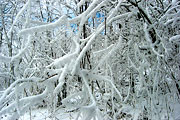The trails of winter
by Danny Bernstein

Walking in a winter wonderland: Rime ice adds a chilling spectacle to cold-weather hikes. photo by Danny Bernstein
|
When I moved to Asheville from New Jersey, I brought all of my winter-hiking gear with me, including crampons, snowshoes, cross-country skis, a down jacket and an ice axe. I figured I wouldn’t need any of it once I was down south, but I owned it already, so why not bring it with me?
So far, I’ve used the skis and down jacket just once, on a vacation to the Canadian Rockies. I sold the ice axe through Second Gear in West Asheville. (Bless them — I wonder who bought it?) The rest of the stuff is gathering dust somewhere in my house. The truth is, you simply don’t need much winter equipment to hike around here, unless you’re planning an extended stay on the summit of Mount Mitchell.
On prior visits to Vermont, New Hampshire and even the central Catskills without snowshoes, I would “posthole” on hikes, suddenly finding myself waist-deep in snow. Here, though, you can forget about those pictures in the L.L. Bean catalog of down-jacketed couples holding hands as they snowshoe across a frozen landscape. In the Southern Appalachians, you can generally get by with just a bit of warmer clothing and a handful of common-sense rules.
It’s worth putting up with the extra layers though. Even in this climate, the woods are markedly different in winter. The leaves are down and the mountain views, usually sealed off by a wall of green, open up. Rime ice — an opaque coating of tiny, white, granular ice particles — hangs from bare branches in gorgeous shapes. Fewer people are on the trails, and the insects have mostly disappeared. I say “mostly” because I was shocked last month to see yellow jackets still buzzing around at 3,500 feet.
Due to the shorter days, hikers should plan to start out early, set a turnaround time — and stick to it. Otherwise they might find themselves trudging through the dark and cold. Remember the 1996 Mount Everest disaster, which Jon Krakauer hauntingly chronicled in the best seller Into Thin Air? The tragedy has been analyzed for years, but much of the climbers’ trouble can be attributed to their failure to follow their plans.
Two groups climbing the world’s tallest peak that year were devastated by accidents and deaths. The guides, American Scott Fischer and New Zealander Rob Hall, lost the most people ever on a single day on Everest. Both leaders died on the mountain themselves, trying to rescue members of their parties. The New Zealand group, in particular, succumbed to the temptation to satisfy the fantasies of folks who’d paid $65,000 apiece for the commercial climb (plus thousands more for the flight and climbing gear). “Just a little farther, please,” one can imagine them saying. “We’re so close.”
Krakauer, the journalist sent by Outside magazine to join Hall’s party, had taken a year to get in shape for this expedition. He managed to reach the summit of Mount Everest and make it back to write about it. His account is unforgettable, but the basic lesson for the rest of us is simple: Never underestimate the mountain or the weather.
Winter hiking in the Blue Ridge
Around here, you know the winter-hiking season has started here when sections of the Blue Ridge Parkway close. Since it’s primarily a tourist road, the powers that be don’t hesitate to shut it down when they think the driving conditions might be dangerous. The tunnels, in particular, tend to get icy first and stay that way throughout the season. Once the Parkway closes to car traffic, though, you’re free to walk, bike and, if the elements cooperate, cross-country ski up there. For up-to-date information, call the Parkway info line (298-0398).
Layer your clothing: thin polypropylene underwear, a fleece shirt or jacket, and a waterproof shell on top. Never wear cotton or jeans. Besides water, bring a thermos filled with a warm drink.
At lower altitudes (below 3,500 feet), you can usually avoid snow while enjoying winter views. Try The North Carolina Arboretum, Bent Creek or Dupont State Forest. Another favorite at this time of year is the Mountains-to-Sea Trail, especially setting off from the Folk Art Center (off Tunnel Road in east Asheville). Or, farther afield, head for the Mountain Bridge Wilderness in Upstate South Carolina.
But if it’s snow you’re after, the Mount Sterling campsite (5,820 ft.) or Mount LeConte (6,593 feet) are good bets. The lodge at the latter is closed iin the winter, but you can stay in the shelter there. It’s not Mount Everest by any means, but it’s winter enough for me.
[Hike leader and outdoors writer Danny Bernstein can be reached at danny@hikertohiker.org.]


Before you comment
The comments section is here to provide a platform for civil dialogue on the issues we face together as a local community. Xpress is committed to offering this platform for all voices, but when the tone of the discussion gets nasty or strays off topic, we believe many people choose not to participate. Xpress editors are determined to moderate comments to ensure a constructive interchange is maintained. All comments judged not to be in keeping with the spirit of civil discourse will be removed and repeat violators will be banned. See here for our terms of service. Thank you for being part of this effort to promote respectful discussion.